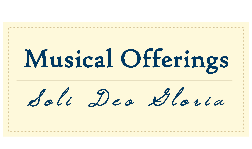Publication Date
10-7-2019
Document Type
Article
Keywords
J.S. Bach, Martin Luther, Reformation, theology, Lutheran, worship, religion
Abstract
The artistic figure and music of Johann Sebastian Bach looms large in the history of Western arts and culture. His influences were many, but one strong influence in his life's work was that of the Protestant Reformation and the theology of the Lutheran church. Through this research, it is evident that Bach strongly held to the doctrines and theology of the Lutheran church and that his employment in the Lutheran church was not merely a vocation for him, but an outward expression of his inward religious and theological conviction. This position is evidenced by the writings and teachings of Martin Luther, specifically his writings on music. In these writings, Luther argues that music and theology are complementary of one another, and that music in the church is one of the strongest ways through which to communicate theology and the truth of scripture. The practice of the Lutheran church also suggests that Bach had a strong understanding of Lutheran theology, specifically the Lutheran catechisms. Finally, in the sacred works of Bach himself, specifically his cantatas, the theology of the Lutheran church and the religious conviction of the Protestant Reformation can be clearly observed. This research has been assembled through the study of historical documentation in the form of primary and secondary sources.
Volume
10
Issue
2
Article Number
3
DOI
10.15385/jmo.2019.10.2.3
Recommended Citation
Ryan, James H.
(2019)
"Music next to Theology: The Impact and Influence of Martin Luther's Reformation on Johann Sebastian Bach,"
Musical Offerings: Vol. 10:
No.
2, Article 3.
DOI: 10.15385/jmo.2019.10.2.3
Available at:
https://digitalcommons.cedarville.edu/musicalofferings/vol10/iss2/3
Creative Commons License

This work is licensed under a Creative Commons Attribution-Noncommercial-No Derivative Works 4.0 License.
Disclaimer
The CedarCommons repository provides a publication platform for fully open access journals, which means that all articles are available on the Internet to all users immediately upon publication. However, the opinions and sentiments expressed by the authors of articles published in our journals do not necessarily indicate the endorsement or reflect the views of Digital Services, the Centennial Library, or Cedarville University and its employees. The authors are solely responsible for the content of their work. Please address questions to the Digital Services staff.
Copyright
© 2019 James Ryan. All rights reserved.

